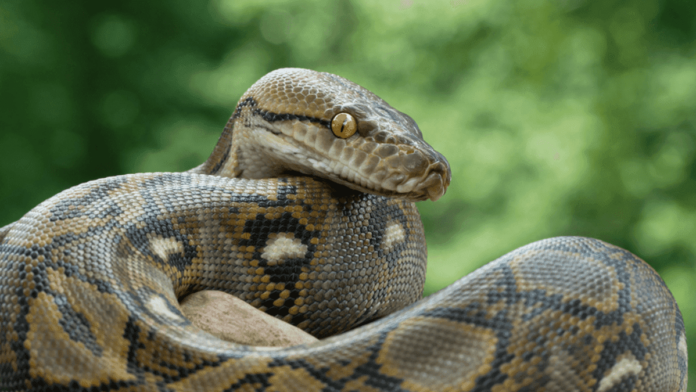Would you eat snake meat?
You may have to overcome your squeamishness, because they are protein-making machines and could solve some world food supply problems.
A study published in Nature claims diminishing natural resources and increasing climate volatility are prompting the need for alternative sources of protein, which is why we should consider farming snakes, particularly pythons.
According to the report, python farming is well established in Asia and feeding studies have shown pythons are a highly efficient, environmentally friendly source of protein.
Report authors studied two farms, one in Thailand and one in Vietnam, which farmed reticulated pythons and Burmese pythons.
“In terms of food and protein conversion ratios, pythons outperform all mainstream agricultural species studied to date,” the report stated.
Like a Labrador
“They’re gluttonous by nature — like a Labrador, they just keep on eating,” the study’s lead author, Dr Daniel Natusch, said.
And it’s all down to their metabolism. As cold-blooded animals, snakes don’t allocate their energy to keeping warm, unlike a cow or pig, which can spend about 80-90 per cent of their food intake on keeping warm.
“Cold-blooded animals such as pythons don’t have that constraint – they’re able to allocate far more of the energy they get from their food into things like growth.”
Snakes can also survive long periods without food, unlike other food production animals.
“Several animals in our study were only eight months old and yet they had gone four months of their lives – 50 per cent – without eating anything and were continuing to grow,” Dr Natusch said.
“That has real-world implications for a future where we expect increasing drought, heatwaves, climatic and economic volatility and supply chain breakdowns.”
Other benefits of snake farming include they don’t require much space, do not have the complex animal welfare issues of caged birds or mammals and seldom transmit viruses such as bird flu, swine flu or COVID-19.
Chicken heads
The report also states that unlike range animals, snakes can eat waste protein from other production models such as chicken heads and the meat is high in protein and low in fat. The snakes were even fed ‘wild-caught rodents’, which the study made clear were local rats.
Even snake waste is better for the environment. Snake faeces are excreted as water-insoluble urates rather than the more volatile ureas.
However, there are a few points against snake farming. Feeding them can be labour-intensive, technical expertise is expensive and rare, their animal husbandry requirements are poorly understood, and probably the big one … humans don’t like snakes.
And about the taste, well, according to Dr Natusch, it’s just like chicken.
“To be perfectly fair, it is quite bland … it depends on what you season it with,” he said.
“It’s a very lean meat … so very, very low in fat.
“I think it is a bit of a leap for people to go straight to snake, but [if] you get a celebrity chef on it and do it well, you’re going to convert a lot of people because it tastes absolutely fine and it’s very versatile.”
Would you eat a snake? Have you ever eaten a snake? Why not share your experience in the comments section below?
Also read: Extraordinary facts about snakes


I suppose eating snakes and having to feed them rats will help to control the rat population, yuk!